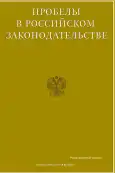Поправки 2020 г. к Конституции Российской Федерации и парламентаризм
- Авторы: Шульженко Ю.Л.1
-
Учреждения:
- Институт государства и права РАН
- Выпуск: Том 16, № 2 (2023)
- Страницы: 48-54
- Раздел: Публично-правовые (государственно-правовые) науки
- URL: https://journal-vniispk.ru/2072-3164/article/view/250244
- ID: 250244
Цитировать
Аннотация
Цель исследования. Поправки 2020 г. к Конституции нашей страны имеют важное значение. Их объем, характер, сущность свидетельствуют, с нашей точки зрения, фактически о новой редакции Основного закона РФ. Поправки в той или иной мере коснулись практически всех важнейших государственно-правовых институтов. Это в полной мере касается и такого из них как парламентаризм. И именно анализ здесь новшеств является целью данной статьи. Представлено прежде всего авторское лаконичное определение парламентаризма - верховенство парламента. Подчеркнуто, что отношение к данному институту в нашей стране было различно. Так, при социализма он фактически отрицался. Возрождение парламентаризма началось в 90-е годы прошлого века, что нашло свое наиболее яркое отражение в Конституции РФ 1993 г. В Поправкам к ней 2020 г. новшества касающиеся парламентаризма нашли свое выражение в первую очередь в положениях касающихся организации верховного народного представительства России – Федерального Собрания РФ, в особенности статуса его членов; функций отечественного парламента, и в первую очередь давно сложившегося контрольного полномочия; формирования ряда важнейших государственных органов. В центре внимания главный вопрос парламентаризма - взаимоотношения парламента и правительства. ВЫВОДЫ. Анализ Поправок 2020 г. к Конституции РФ свидетельствует о том, что парламентаризм есть и будет одним из главнейших институтов отечественной государственности. Он важнейший гарант обеспечения верховенства Федерального Собрания – парламента России. Поправки идут по пути повышения статуса парламентаризма, его совершенствования, и в первую очередь в сфере его контрольных полномочий. При подготовки статьи использованы прежде всего три основных научных метода исследования–догматический, исторический, сравнительный.
Ключевые слова
Полный текст
Открыть статью на сайте журналаОб авторах
Юрий Леонидович Шульженко
Институт государства и права РАН
Автор, ответственный за переписку.
Email: shulzhenko_yu@mail.ru
д-р юрид. наук, профессор, заслуженный юрист РФ, главный научный сотрудник сектора конституционного права и конституционной юстиции
Россия, МоскваСписок литературы
- Авакьян С.А. Федеральное Собрание – парламент России. Российский юридический издательский дом. М., 1999. – 432 С.
- Баглай М. В. Конституционное право Российской Федерации. Учебник для Вузов. 2-изд. Норма. М.,1999. –776 С.
- Коврякова Е.В. Парламентский контроль:зарубежный опыт и российская практика. Городец. М., 2005.
- Корф С.А. Русское государственное право. Ч 1. Поставщик двора его величества скоропечатня А. Л.А. Левенсона, Гельсинфорс., 1915. - 315 С.
- Лазаревский Н.И. Русское государственное право. Т.1. Конституционное право. 3 – е изд. СПб, 1913. – 672 С.
- Нуденко Л.А. Конституционное права России. Юрайт. М., 2011. – 581 С.
- Парламентское право России. Учебное пособие. Юрист. М., 1999.
- Парламентское право. Учебник. Под ред. О.Н. Булакова. Эксмо. М., 2006 – 656 С.
- Парламентское право России. Монография. Под ред. Хабриевой Т.Я. Государственная Дума. М., 2013. – 400 С.
- Соколов К.Н. Парламентаризм. Опыт правовой теории парламентарного строя. Типография «Печатный труд», СПб, 1912. – 432 С.
- Хабриева Т.Я., Клишас А.А. Тематический комментарий к Закону Российской Федерации о поправке к Конституции Российской Федерации от 14 марта 2020 г. № 1 -ФКЗ о «О совершенствовании регулирования отдельных вопросов организации и функционирования публичной власти». Норма. М., 2020. – 240 С.
- Чиркин В.Е. Конституционное право России: учебник. 6-е изд. Норма. М., 2009. – 495 С.
- Шульженко Ю.Л. Российская теория парламентаризма. Юрлитинформ. М., 2018. – 168 С.
- Cotemporary Europa – Haundmills Besingstokc Hampshire and Ljndon. 2000 P.127 – 130.
- Parlamentsrecht und Parlamentspraxis in der Bundesrepublik Deutschland/ B.N.Y.1989.
Дополнительные файлы








